 Follain’s impersonal perspective puts him, in Francis Ponge’s phrase, on the side of objects. The natural features and man-made things that fill his poems are given presences of their own, which Follain brings out with a sharp eye and an understanding of their place within the human world.
Follain’s impersonal perspective puts him, in Francis Ponge’s phrase, on the side of objects. The natural features and man-made things that fill his poems are given presences of their own, which Follain brings out with a sharp eye and an understanding of their place within the human world.
A review of Where do you live? by Hanaa Ahmad Jabr and Jennifer Jean
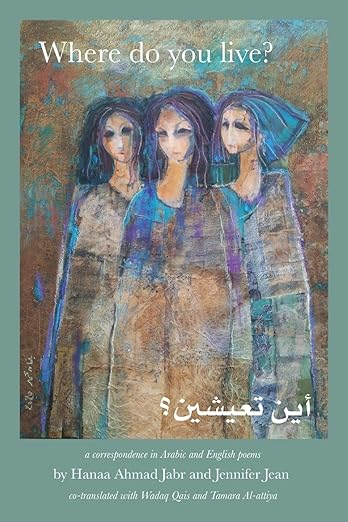 The job of creative individuals, then, is to bear witness to the horrors inflicted by those who would destroy “our distant spark of light.” We must resist and carry our light into the future. Our task, says Where do you live?, is to be constantly raw , constantly attuned to these insults. We must feel them, record them, and keep going.
The job of creative individuals, then, is to bear witness to the horrors inflicted by those who would destroy “our distant spark of light.” We must resist and carry our light into the future. Our task, says Where do you live?, is to be constantly raw , constantly attuned to these insults. We must feel them, record them, and keep going.
A review of The Dingo’s Noctuary by Judith Nangala Crispin
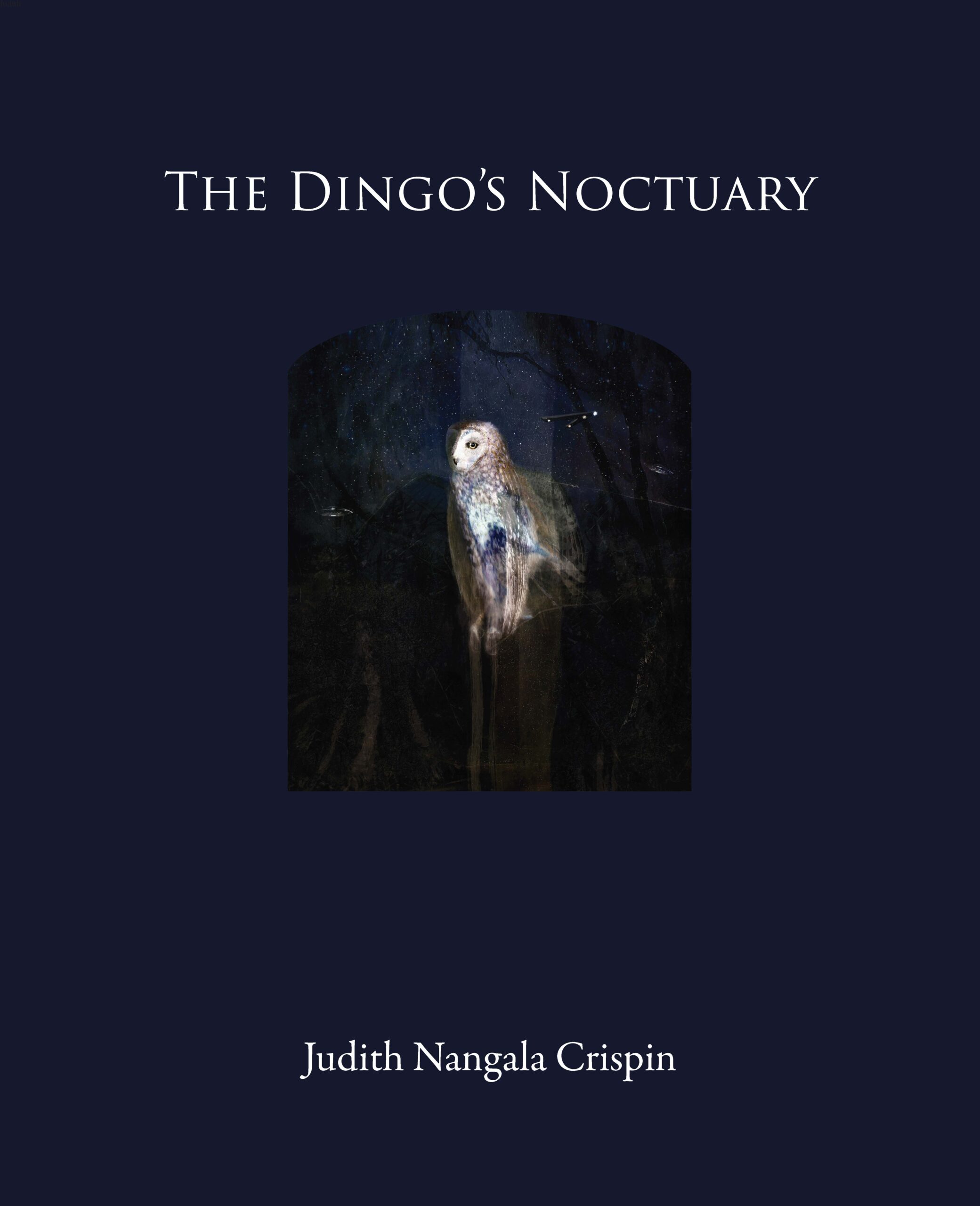 The idea that we are all en route to returning to outer space is a healing and consoling thought, bringing together the many themes in the book in a way that is both beautiful and heartbreaking. At $130,The Dingo’s Noctuary is not a cheap book, but it is a work of art, and one that continues to call the reader back to find new threads, new stories, and new transformations.
The idea that we are all en route to returning to outer space is a healing and consoling thought, bringing together the many themes in the book in a way that is both beautiful and heartbreaking. At $130,The Dingo’s Noctuary is not a cheap book, but it is a work of art, and one that continues to call the reader back to find new threads, new stories, and new transformations.
It Can Happen Here. And Here. And Here: a review of Helen Button by Carol Roh Spaulding
 Helen Button is a minor character in Stein’s 1940 novel Paris, France. But in Carol Roh Spaulding’s ambitious, painstakingly researched, dual-narrative novel, Hélène—whose American mother is fragile, whose French father has left the family, and whose stuffy stepfather, while by no means a horror, works for the Vichy government—arrives on the page as an eighty-three year-old woman in 2005, haunted by the memory of Isaiah Langwill, a three-year-old Jewish orphan who may or may not have been sent to a concentration camp from a hiding place near Stein and Toklas’s country home.
Helen Button is a minor character in Stein’s 1940 novel Paris, France. But in Carol Roh Spaulding’s ambitious, painstakingly researched, dual-narrative novel, Hélène—whose American mother is fragile, whose French father has left the family, and whose stuffy stepfather, while by no means a horror, works for the Vichy government—arrives on the page as an eighty-three year-old woman in 2005, haunted by the memory of Isaiah Langwill, a three-year-old Jewish orphan who may or may not have been sent to a concentration camp from a hiding place near Stein and Toklas’s country home.
An interview with John Stith
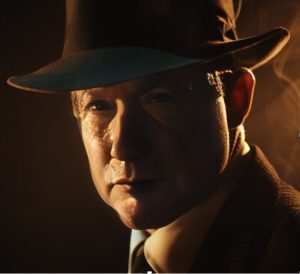 On a hillside in a sand-colored, Sante Fe style house, surrounded with natural, wild vegetation, writer John E. Stith is busy working on his next novel. (The landscape is tended by his wife, Karen, who is a master gardener.) Now 78, Stith is busier than ever. Last year his novel Disavowed (Amazing Selects) was published, as was his young adult trilogy, Tiny Time Machine. He’s also working with folks in the movie business to get his novel Manhattan Transfer to the big screen…or a smaller TV screen, or any screen. Stith is quiet, unassuming, a tech whiz, (he’s made his own computers) has a wry sense of humor, can discuss and is interested in…everything. As we sit in his sunlit front room, surrounded by books, his awards, and posters of his novels, he brings me up to date on his writing.
On a hillside in a sand-colored, Sante Fe style house, surrounded with natural, wild vegetation, writer John E. Stith is busy working on his next novel. (The landscape is tended by his wife, Karen, who is a master gardener.) Now 78, Stith is busier than ever. Last year his novel Disavowed (Amazing Selects) was published, as was his young adult trilogy, Tiny Time Machine. He’s also working with folks in the movie business to get his novel Manhattan Transfer to the big screen…or a smaller TV screen, or any screen. Stith is quiet, unassuming, a tech whiz, (he’s made his own computers) has a wry sense of humor, can discuss and is interested in…everything. As we sit in his sunlit front room, surrounded by books, his awards, and posters of his novels, he brings me up to date on his writing.
A review of The Resemblance of All Things by Bernard J. Lurie
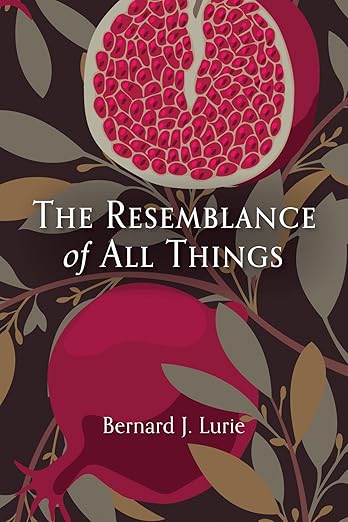 The book is divided into four parts. Each part is prefaced by a single prefatory line indicting that what follows is directed to a different biblical prophet. None of them speak in the poem. The prophets are addressed indirectly, through intermediaries of God, regarding matters about which they prophesied. It does not restate their views. Neither does the poem advocate on behalf of or against any faith.
The book is divided into four parts. Each part is prefaced by a single prefatory line indicting that what follows is directed to a different biblical prophet. None of them speak in the poem. The prophets are addressed indirectly, through intermediaries of God, regarding matters about which they prophesied. It does not restate their views. Neither does the poem advocate on behalf of or against any faith.
A review of I Wrote This for Attention by Lukas Gage
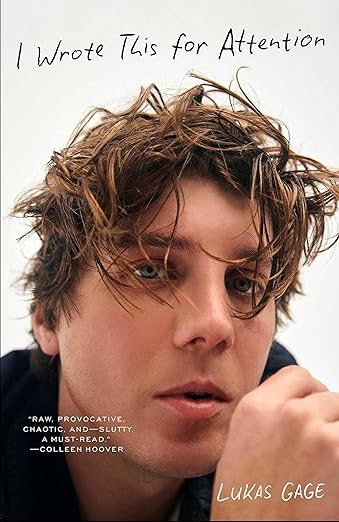 When Gage talks about his “gnawing, pathological hunger to prove my worth,” he’s at his most compelling precisely because, as the memoir closes, you come to understand the internet is his ribcage. But as with everything internet-coded, he flees the potentially parasocial, the baring himself, for the lark, burned by the internet and approval hunger. By the final line we become him in his post-divorce trip to Iceland, looking up from the grief only to find “the Northern Lights—the one constant in this strange, icy night—were gone.
When Gage talks about his “gnawing, pathological hunger to prove my worth,” he’s at his most compelling precisely because, as the memoir closes, you come to understand the internet is his ribcage. But as with everything internet-coded, he flees the potentially parasocial, the baring himself, for the lark, burned by the internet and approval hunger. By the final line we become him in his post-divorce trip to Iceland, looking up from the grief only to find “the Northern Lights—the one constant in this strange, icy night—were gone.
A review of Exiles in New York City by Philip T. Yanos
 One thing is clear: deep journalistic inquiry, such as Yanos’ Exiles in New York City, sheds much-needed light on a social morass that has been with us far too long. His reportorial zest, coupled with an inspiring sense of humanity and deep inquiry, is present on every page of this eye-opening book. This is a book about how we choose to live now, even when some of our lives are sequestered, shaded from prying eyes behind a meshwork of barbed wire fence.
One thing is clear: deep journalistic inquiry, such as Yanos’ Exiles in New York City, sheds much-needed light on a social morass that has been with us far too long. His reportorial zest, coupled with an inspiring sense of humanity and deep inquiry, is present on every page of this eye-opening book. This is a book about how we choose to live now, even when some of our lives are sequestered, shaded from prying eyes behind a meshwork of barbed wire fence.
A review of The Woman in the Ship by Sapphira Olson
 The Woman in the Ship, by Sapphira Olson, illustrates both of these concepts: mankind’s ceaseless curiosity for what is beyond the night sky, and the awesome toll attendant to the manufacture of greater and greater AI. It is a story of love and loss, retro and future, hope and fear, and science and humanity. As well, it is steeped in robust feminism, both in terms of illustrating struggle and oppression, and triumph and overcoming.
The Woman in the Ship, by Sapphira Olson, illustrates both of these concepts: mankind’s ceaseless curiosity for what is beyond the night sky, and the awesome toll attendant to the manufacture of greater and greater AI. It is a story of love and loss, retro and future, hope and fear, and science and humanity. As well, it is steeped in robust feminism, both in terms of illustrating struggle and oppression, and triumph and overcoming.
A review of Sea, Poison by Caren Beilin
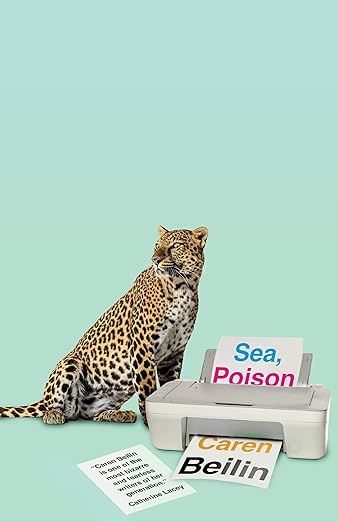 Both despite and because of the sweeping, sincere critiques of medical and capitalist corruption, Beilin buoys her sea with tongue-in-cheek wit as well as humor, a hallmark of Oulipian writing. Every joke and turn of phrase maintains the novel’s brisk pace, an asset most well-executed when Cumin’s post-surgery mind sputters out choppy fragments.
Both despite and because of the sweeping, sincere critiques of medical and capitalist corruption, Beilin buoys her sea with tongue-in-cheek wit as well as humor, a hallmark of Oulipian writing. Every joke and turn of phrase maintains the novel’s brisk pace, an asset most well-executed when Cumin’s post-surgery mind sputters out choppy fragments.